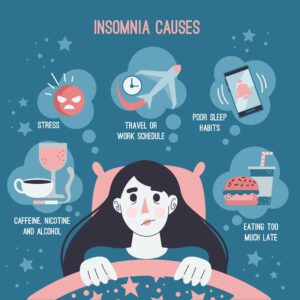Struggling to sleep, feeling tired despite sleeping—can indeed be signs of various sleep disorders or other health concerns.
Insomnia can have various effects on the aspects of life. It can hamper our mood, energy, work performance and overall well-being can be hampered due to insufficient sleep..
Have you been experiencing symptoms of Insomnia?
Short-term Insomnia can often be linked to specific stressful events or changes in routine, and it tends to resolve once the stressor is addressed. However, chronic Insomnia lasting for a month or more can be more complex, potentially linked to various factors including underlying medical conditions, medications, or lifestyle habits. It’s important to identify and address any underlying causes contributing to chronic insomnia to effectively manage it. Seeking professional guidance can help in determining the best approach for managing chronic Insomnia and improving sleep quality.
Causes of Insomnia
While there are numerous factors contributing to Insomnia some ones often stand out:
Stress and Anxiety: Concerns about work, health, family, or traumatic life events can keep the mind active, making it hard to unwind and fall asleep.
Poor Sleep Habits: Irregular sleep schedules, excessive napping, engaging in stimulating activities before bed, or using electronic devices can disrupt the body’s natural sleep-wake cycle.
Medical Conditions: Underlying health issues such as chronic pain, asthma, heart conditions, gastrointestinal problems, or hormonal imbalances can interfere with sleep.
Mental Health Disorders: Anxiety, depression, PTSD, and other mental health conditions often impact sleep patterns, causing difficulties in falling or staying asleep.
Medications: Certain prescription and over-the-counter medications have side effects that can disrupt sleep, including some antidepressants, asthma medications, pain relievers, or cold remedies.
Substance Use: Consumption of stimulants like caffeine or nicotine, especially close to bedtime, as well as alcohol, which may initially aid sleep but disrupts sleep cycles, can lead to insomnia.
Impact of Insomnia
Sleep deprivation or poor sleep quality can indeed lead to various complications.
Impaired Daily Functioning: Insomnia can reduce performance at work or school due to decreased concentration, memory issues, and reduced cognitive abilities.
Safety Risks: Slowed reaction times due to lack of sleep can increase the risk of accidents, particularly while driving or operating machinery.
Mental Health Impacts: Insomnia is strongly linked to mental health disorders such as depression, anxiety, and substance abuse, and it can exacerbate the symptoms of these conditions.
Health Conditions: Chronic insomnia is associated with an increased risk of developing long-term health issues like high blood pressure, heart disease, obesity, and diabetes. It can also worsen the severity of these conditions in individuals who already have them.
Solution!
An excellent set of practices to promote better sleep! Consistency in bedtime and wake time helps regulate the body’s internal clock, contributing to a more stable sleep routine. Staying physically active during the day can enhance sleep quality, while checking medications for potential sleep-disrupting side effects is crucial.
Limiting naps, caffeine, and alcohol, as well as avoiding nicotine, especially before bedtime, can greatly aid in achieving restful sleep. Eating light meals and avoiding large beverages before sleep helps prevent discomfort that might disrupt sleep.
Creating a soothing bedtime routine and ensuring a comfortable sleep environment in the bedroom, reserved primarily for sleep and intimacy, encourages relaxation and signals the body that it’s time to wind down. These practices collectively contribute to improved sleep hygiene and overall sleep quality.
Even Ayurveda has solutions when struggling to sleep, one of the most practicing and proven ways for a sound and healthy sleep is drinking warm milk with ginger. Try to drink hot-fresh milk 30 minutes before jumping into the bed, even a head massage for 10-15 minutes can help you in deep sleep.
